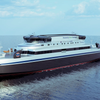Bulk Cargo IMSBC Code Requirements
A review of recent incidents has highlighted a failure of not only ship’s crew, but also charterers and shippers, to comply with the mandatory requirements of the International Maritime Solid Bulk Cargoes (IMSBC) Code.
The IMSBC Code became mandatory for all SOLAS vessels carrying solid bulk cargoes from January 1, 2011. The operators of these vessels must ensure that cargoes are loaded and carried in accordance with the requirements of the IMSBC Code to maintain the structural integrity of the vessels and safety of the crew at all times. It is the responsibility of cargo vessel operators to ensure that all cargoes are carried in accordance with the requirements of their classification society.
The consequences of failure to comply with the Code can be considerable. When bulk cargoes shift, liquefy, catch fire or explode as a consequence of poor loading procedures, ships may capsize, lose stability or sustain severe structural damage. Such incidents increase the risk of death, injury, insurance claims, operational delay and considerable expense.
Lloyd’s Register, the UK P&I Club, and Intercargo have produced a pocket guide for ships’ officers and agents who arrange cargoes for loading.
This outlines the precautions to be taken before accepting solid bulk cargoes for shipment, sets out procedures for safe loading and carriage, details the primary hazards associated with different types of cargo and underlines the importance of proper cargo declarations. A quick reference checklist and flowchart summarize the steps to be followed.
Printed copies of the pocket guide can be ordered from the LR webstore, and a PDF of both the pocket guide and flowchart can be downloaded at lr.org/imsbc











